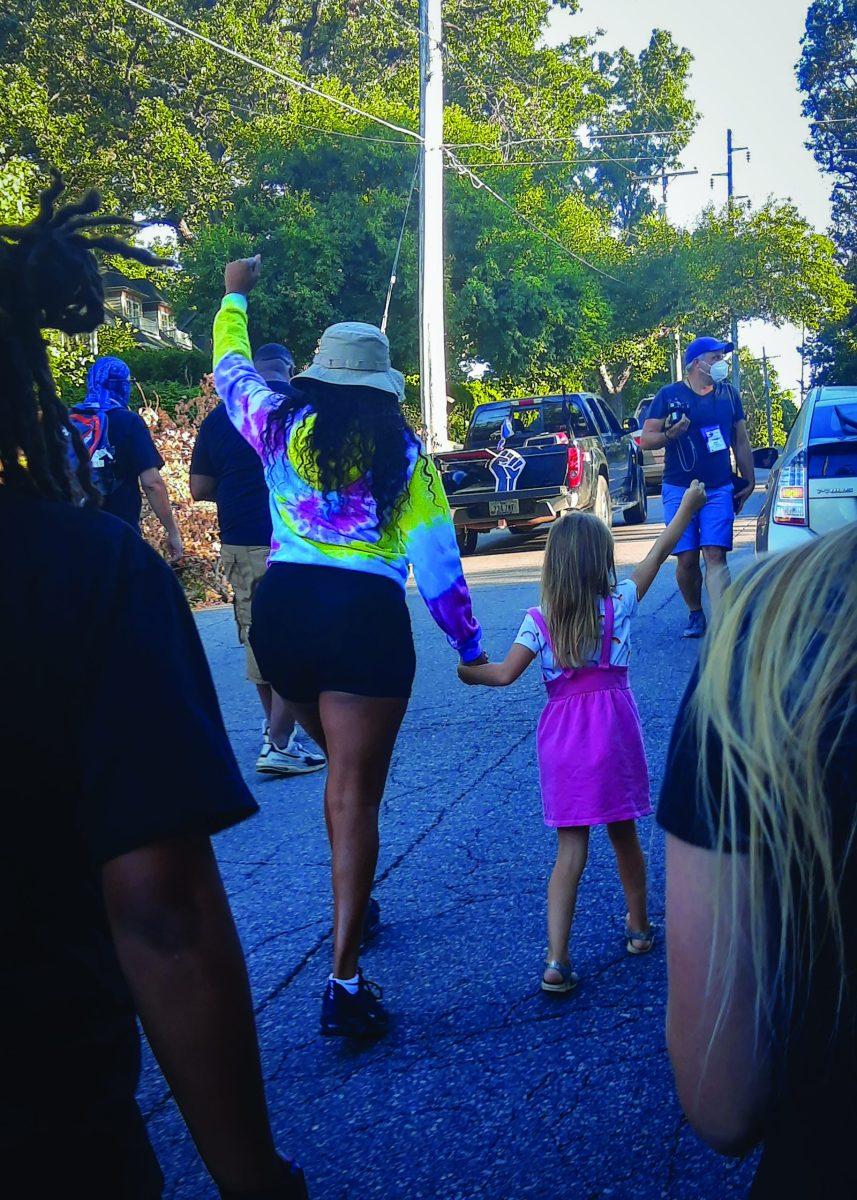George Floyd, Breonna Taylor, Rayshard Brooks – these are just a few of the Black lives lost to police violence in 2020. The death of Floyd on May 25 resulted in a worldwide surge of protests in support of the Black Lives Matter movement, including several in downtown Des Moines.
Demonstrations began in downtown Des Moines on May 29 and continued for several days. While some protests remained peaceful, many others became chaotic. Violent clashes between police and protestors ensued, along with the looting of local businesses and other forms of property damage. In response, the Polk County Board of Supervisors enacted a 9 a.m.-5 p.m. curfew which lasted from May 31 to June 4.
These protests have continued on and off throughout the summer, most recently in response to the police shooting of Jacob Blake in Kenosha, Wisconsin.
Protests are just one aspect of the work BLM does within local communities. The overall aim of the Black Lives Matter movement is to liberate Black individuals through antiracism work.
The movement began in 2013 in response to the acquittal of the man who killed Trayvon Martin, an unarmed Black boy walking home from a convenience store while talking on the phone. The Des Moines chapter was formally established this past June.
Activists involved with the Black Lives Matter movement contribute to their communities in many ways. Some serve as lobbyists, working with state and local officials to enact anti-racism legislation. Others work as organizers, working with the community and other organizations to coordinate events like demonstrations, resource drives and community outreach activities. Even those who cannot show up physically can get involved by donating items to resource drives, spreading awareness on social media or contributing financially.
Jalesha Johnson is a junior at Drake who currently serves as head of the culture department with Des Moines Black Lives Matter.
“A lot of the work I do with DSM BLM is making sure that we are always remembering and uplifting the voices of marginalized Black people, so trying to be as accessible and inclusive as possible,” Johnson said. “Another really large thing that the culture department does is remind people of art’s influence on activism, we’re always trying to bring in creative content when we’re community building, protesting, etcetera.”
Linda Brown, a senior at Iowa State, is a DSM BLM board member also working specifically within the culture department.
“I found my way to activism through RunDSM, a nonprofit organization within Des Moines public schools that encourages and uplifts marginalized youth voices,” Brown said. “They really exposed me to the ways art and activism are intertwined and can be performed to affect change.”
It’s one thing to desire change, but turning those desires into reality takes organization and planning. According to Johnson, DSM BLM has five to ten specific demands, on both the state and local levels, in the works at any given time.
“We want the eviction moratorium back. We don’t believe people should be forced out of their homes, especially during a pandemic,” Johnson said. “We believe that the Des Moines Police Department – and all law enforcement in Iowa really, but right now we’re centering on the city – should be defunded and the money that’s poured into that programming should be reallocated to mental health services in Iowa.”
Additional goals include the decriminalization of cannabis, due to the disproportionate arrest rates of Black individuals as compared to white counterparts, and the establishment of a local citizen review board to serve as an independent investigative entity to pursue misconduct claims within the Des Moines Police Department.
Recently the organization hosted two March on City Council events, bringing those legislative goals to Des Moines City Counselors directly. The march held the weekend of the Aug. 15 ended at the residence of Ward 4 City Council Member Joe Gatto, while this weekend’s protest ended at Ward 3 City Council Member Josh Mandelbaum’s home.
Des Moines Black Lives Matter spent a great deal of time this summer working to reestablish voting rights for most felons. Governor Kim Reynolds signed an executive order doing so on Aug. 5, but according to Brown the movement will continue pushing for a more permanent solution: a constitutional amendment.
Johnson said that the community can soon expect to see the organization currently known as DSM BLM referred to under a different name – the Des Moines Black Liberation Movement.
“We haven’t made the drop yet. Everything’s all planned out, it’s just that we’re trying to make sure that we’re as sensitive as possible and there has been a lot of things going on,” Johnson said. “We think that it’s easy to say that you value someone’s life, but that doesn’t necessarily mean that you believe money, housing and resources should be allocated to these individuals. Not only do we believe that Black people should not die, we believe that Black people should be able to lead a free, liberated life.”
On Aug. 19, DSM BLM announced a partnership with Des Moines Mutual Aid. Together the organizations have established the Des Moines Rent Relief Fund, meant to serve as a cushion for the countless Iowans at risk of losing their homes due to pandemic-related job loss and the expiry of both federal and state eviction moratoriums. Contributions to the fund can be made through Venmo, PayPal, or Cash App under the user tag DSMBLMRentRelief.
To learn more about the work Des Moines Black Lives Matter is doing in the community, visit their social media accounts on Facebook and Instagram, both of which are listed under DesMoinesBLM.







